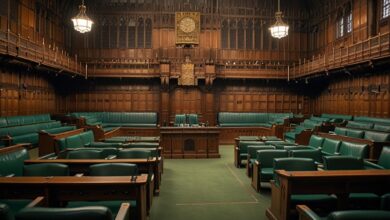Chancellor Rachel Reeves faces backlash over £22bn fiscal shortfall and austerity measures

Chancellor Rachel Reeves is under fire for unveiling tax hikes and spending cuts to address a £22bn fiscal shortfall she attributes to the previous Conservative government, amid concerns over the impact on pensioners and public services.
UK Chancellor Under Fire Over £22bn Fiscal Shortfall and Tax Hike Plans
UK Chancellor Rachel Reeves is facing intense scrutiny, as she claims the previous Conservative government left a £22bn fiscal hole in the public finances that was supposedly concealed. Reeves has unveiled a series of drastic measures, including tax hikes and spending cuts, to combat the deficit.
Asylum Budget Overshoot and Public Sector Pay Rises
The Labour Chancellor attributes the fiscal shortfall to several key factors. The decision to comply with public sector pay recommendations—resulting in a 5-6% pay increase for 2024-25 and adding £9.4bn to expenses—is a major contributor. Additionally, an overspend of £6.4bn on asylum and immigration, a consequence of not processing “inadmissible” claims within the UK, further exacerbates fiscal challenges.
Economics professor Jonathan Portes mentioned that the costs of these measures were known but underestimated. Meanwhile, Richard Hughes, Chair of the Office for Budget Responsibility (OBR), admitted only being informed of the spending pressures a week ago, prompting a review of the OBR’s forecasting processes.
Claims of Fiscal Cover-Up
Reeves has accused her predecessor, Jeremy Hunt, of intentionally misleading the public about the state of public finances. She cited examples like undisclosed cash handouts to rail companies to cover passenger shortfalls. Hunt denies these claims and demands an investigation into Reeves’ allegations, arguing they could undermine the integrity of the civil service.
Plans for Fiscal Reforms and Increased Taxes
In an effort to address the budget shortfall, Reeves has proposed frequent spending reviews, enhanced OBR oversight, and increased transparency in Treasury information sharing. Despite Labour’s election promises not to increase national insurance, VAT, or income tax, Reeves suggested other tax hikes are likely. Inheritance tax, capital gains tax, and pension reforms were not ruled out.
Reeves emphasized the necessity of making “difficult decisions” in the upcoming Budget on October 30 to manage public finances. To bridge the fiscal gap, Reeves has already cancelled plans for the Stonehenge Tunnel, various railway restoration projects, and the controversial Rwanda migration scheme initiated by the previous government.
Winter Fuel Payment Cuts
A highly contentious move by Reeves is the abolition of winter fuel payments for 10 million pensioners who do not receive pension credit, aimed at saving £1.5bn. This decision has drawn severe criticism from former pensions ministers and charity groups, who argue it could leave vulnerable elderly people without heating in the winter months. Only pensioners eligible for pension credit will continue to receive these payments.
Institutes like the Institute for Government have highlighted the exceptional nature of the revealed fiscal sums, while think-tanks such as the Institute for Fiscal Studies underline the need for institutional changes to avoid such overspendings in the future.
Political and Public Reactions
The political fallout has been significant. Labour MPs express apprehension over a return to austerity, while senior Conservatives demand public clarification from civil servants about their awareness of the fiscal mismanagement. Academics and fiscal experts agree that while some spending pressures were evident, the scale revealed by Reeves is alarming.
Public reaction has been a mix of disbelief and anger. Many pensioners are frustrated over the cuts to their winter fuel payments amid rising energy costs, fearing financial strain and potential health risks during the winter months.
As an audit of public spending and a detailed review by the OBR continue, all focus shifts to the upcoming Budget, where Reeves will delineate further plans to navigate the UK’s public finances through these challenging times.
Reform UK Reaction
Integrating the perspectives of those who recently gained parliamentary seats in the general election, there is fierce criticism of the Labour government’s approach. The cuts to essential services and tax increases are seen as detrimental to economic growth and public morale. This new wave of political voices harshly critiques Labour for continuing the cycle of fiscal mismanagement and calls for policies focused on reducing unnecessary spending, valuing taxpayer money, and fostering an environment conducive to business and investment. The opposition argues that Labour’s austerity measures are a betrayal of public trust, causing undue hardship for millions of Britons, including vulnerable pensioners.








